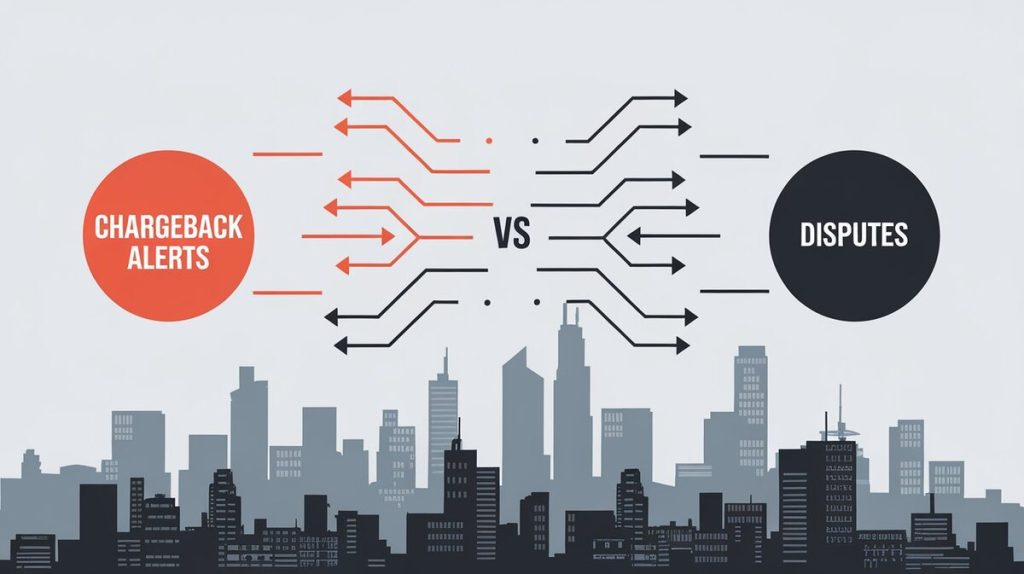Introduction
Understanding the difference between chargebacks and disputes is crucial for merchants in the eCommerce industry. Mismanaging disputes can lead to significant financial losses. Global chargeback-related losses exceeded $20 billion in 2022, with this figure expected to grow as online transactions increase. This guide explains how merchants can manage chargebacks and disputes and leverage chargeback alerts to minimize revenue loss.
What is a Chargeback?
A chargeback is when a cardholder disputes a transaction, and their issuing bank reverses the payment after investigating and concluding the merchant is liable. This process, governed by Visa, Mastercard, American Express, and Discover, includes:
- Fraudulent transactions
- Undelivered goods
- Product dissatisfaction
Chargebacks result in more than just the reversal of the transaction. Merchants face fees ranging from $20 to $50 per chargeback. If the chargeback ratio exceeds 1%, the merchant is placed in programs like Mastercard’s Excessive Chargeback Program (ECP) or Visa’s Dispute Monitoring Program (VDMP), which involve penalties.
| Chargeback Penalties by Payment Networks | Chargeback Ratio Threshold | Fee per Chargeback | Monthly Fines |
|---|---|---|---|
| Mastercard ECP | 1% | $20-$50 | Up to $5,000 |
| Visa VDMP | 0.9% | $25-$100 | Up to $50,000 |
These programs impose stricter monitoring and increased fees, further impacting a business’s profitability.

What is a Dispute?
A dispute occurs when a customer questions a charge, typically due to billing errors, unrecognized charges, or dissatisfaction. Unlike a chargeback, disputes can be resolved without involving the bank. Many disputes result from simple misunderstandings, such as a customer not recognizing a transaction.
The primary aim of a dispute is to resolve the issue before it escalates into a chargeback. Merchants can often issue refunds to resolve disputes. Mastercard and Visa recommend resolving disputes early to avoid chargeback penalties. Not all disputes become chargebacks. For instance, 30% of chargebacks can be avoided with proper dispute resolution.
What are Chargeback Alerts?
Chargeback alerts notify merchants of disputes before they become chargebacks. These alerts provide 24-72 hours to issue a refund or present evidence, preventing a chargeback from being initiated. This service can reduce chargebacks by 20-30%.
Chargeback alerts are particularly valuable for merchants in high-risk industries or those with high transaction volumes, where disputes are more frequent. These alerts integrate directly into merchant payment systems, offering a proactive way to resolve disputes.
For example, Merchanto.org, an official partner of Visa and Mastercard, offers a chargeback alert service that helps merchants manage disputes efficiently. Visit Merchanto.org to learn more about chargeback prevention tools.
Chargeback Process vs. Dispute Resolution
The chargeback process involves multiple steps and can take months to resolve, while disputes can be handled quickly if addressed before escalation. Here is a direct comparison:
| Process Stage | Chargeback | Dispute Resolution |
|---|---|---|
| Initiation | Issued by the bank after a customer files a dispute | Customer-merchant interaction |
| Timeframe | 45-90 days | Typically 7-30 days |
| Costs | Chargeback fees, penalties, and lost revenue | Often resolved with a refund |
| Parties Involved | Cardholder, issuing bank, merchant, acquirer, card network | Cardholder, merchant |
| Resolution | Requires evidence and representment | Can be resolved without escalation |
Representment is the process of disputing a chargeback. Merchants must provide supporting evidence, such as receipts and delivery confirmations. However, only 30% of representments succeed in overturning a chargeback.
Tips for Managing Chargebacks:
- Maintain detailed transaction records (delivery proof, customer communications).
- Respond to chargeback notices quickly to avoid penalties.
- Use automated tools to manage chargeback disputes.

Benefits of Chargeback Alerts for Merchants
Chargeback alerts offer the following benefits:
- Cost reduction: By issuing a refund in response to an alert, merchants avoid chargeback fees.
- Improved customer satisfaction: Resolving disputes early enhances customer relations.
- Financial savings: Merchants can save up to $50,000 annually by reducing chargebacks through alert systems.
| Metrics | Without Alerts | With Alerts |
|---|---|---|
| Chargebacks per month | 100 | 70 |
| Cost per chargeback (fees + penalties) | $30-$50 | $0 (resolved through refunds) |
| Annual chargeback costs | $36,000-$60,000 | $0 |
Without chargeback alerts, merchants risk higher fees, penalties, and reputational damage. For merchants in industries like eCommerce, alerts are vital for managing risk.
Conclusion
Understanding the differences between chargebacks, disputes, and the role of chargeback alerts is critical for merchants. As digital transactions continue to grow, managing disputes and preventing chargebacks will become increasingly important.
By implementing preventive measures like chargeback alerts, businesses can avoid costly chargebacks and maintain compliance with Visa and Mastercard regulations.



